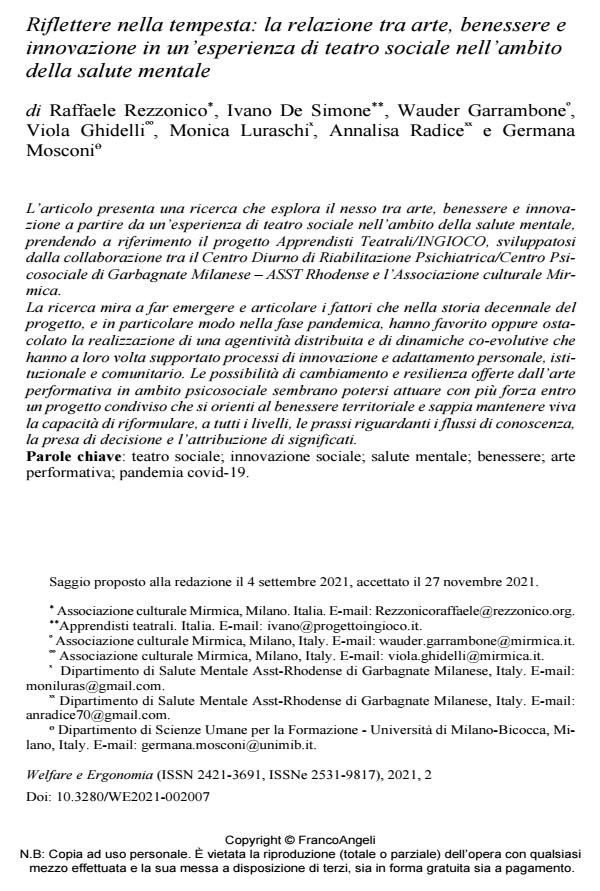Reflecting in the storm: The relationship between art, well-being and innovation in a social theatre experience in the mental health field
Journal title WELFARE E ERGONOMIA
Author/s Raffaele Rezzonico, Ivano De Simone, Wauder Garramboneº, Viola Ghidelli, Monica Luraschi, Annalisa Radice, Germana Mosconi
Publishing Year 2022 Issue 2021/2
Language Italian Pages 15 P. 89-103 File size 198 KB
DOI 10.3280/WE2021-002007
DOI is like a bar code for intellectual property: to have more infomation
click here
Below, you can see the article first page
If you want to buy this article in PDF format, you can do it, following the instructions to buy download credits

FrancoAngeli is member of Publishers International Linking Association, Inc (PILA), a not-for-profit association which run the CrossRef service enabling links to and from online scholarly content.
The paper proposes a research that explores the link between art, well-being and innovation on the basis of an experience of social applied theatre in the field of mental health: the project Apprendisti Teatrali/INGIOCO, developed from the collaboration between the Day Center for Psychiatric Rehabilitation / Psychosocial Center of Garbagnate Milanese - ASST Rhodense and the Cultural Association Mirmica. The research focuses on highlighting and articulating the factors that in over the ten-year history of the project, and particularly in the pandemic phase, have fostered or hindered the realization of a distributed agentivity and co-evolutionary dynamics that have in turn supported processes of innovation and adaptation of individuals, institutions and communities. The potential for change and resilience offered by performance art in the psychosocial field seems to be more strongly expressed in a shared project oriented towards territorial well-being and able to keep alive the capacity to reformulate, at all levels, the practices concerning knowledge flows, decision-making and the attribution of meanings.
Keywords: social applied theatre; social innovation; mental health; well-being; performance art; covid-19 pandemic.
- Introduzione Giulia Innocenti Malini, Alessandro Pontremoli, in WELFARE E ERGONOMIA 2/2022 pp.7
DOI: 10.3280/WE2021-002001
Raffaele Rezzonico, Ivano De Simone, Wauder Garramboneº, Viola Ghidelli, Monica Luraschi, Annalisa Radice, Germana Mosconi, Riflettere nella tempesta: la relazione tra arte, benessere e innovazione in un’esperienza di teatro sociale nell’ambito della salute mentale in "WELFARE E ERGONOMIA" 2/2021, pp 89-103, DOI: 10.3280/WE2021-002007